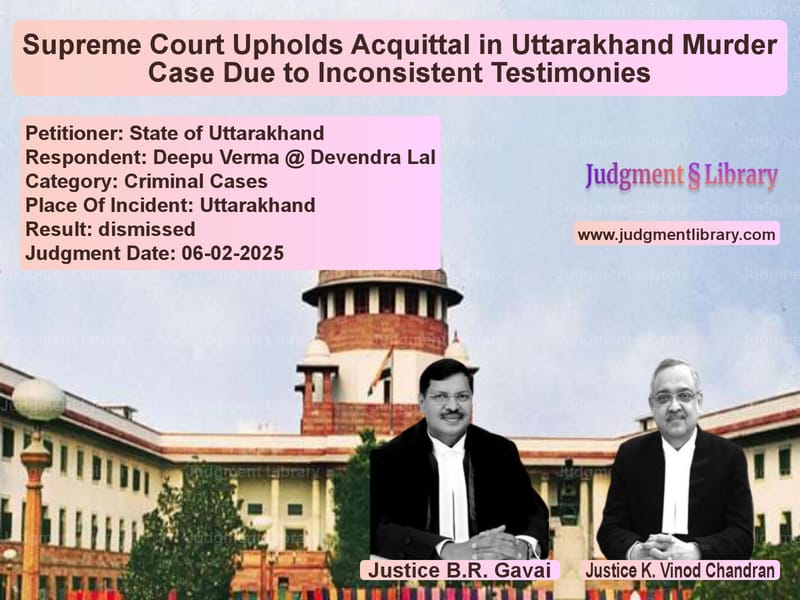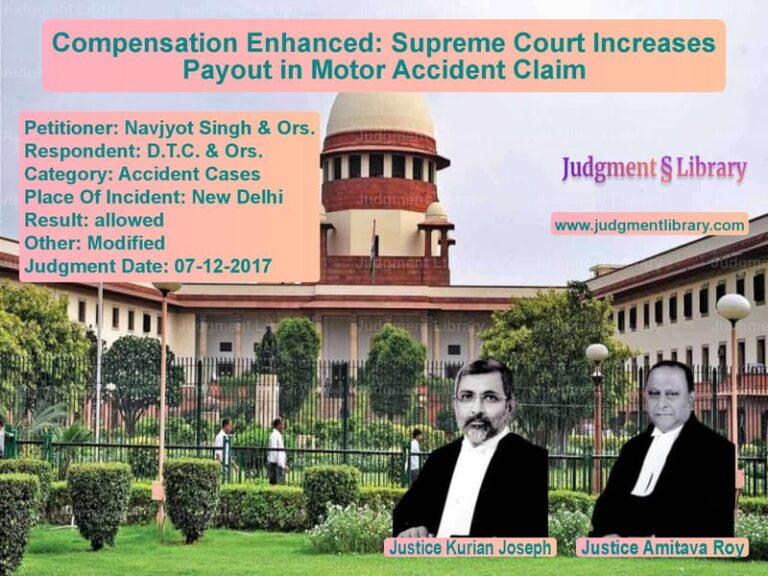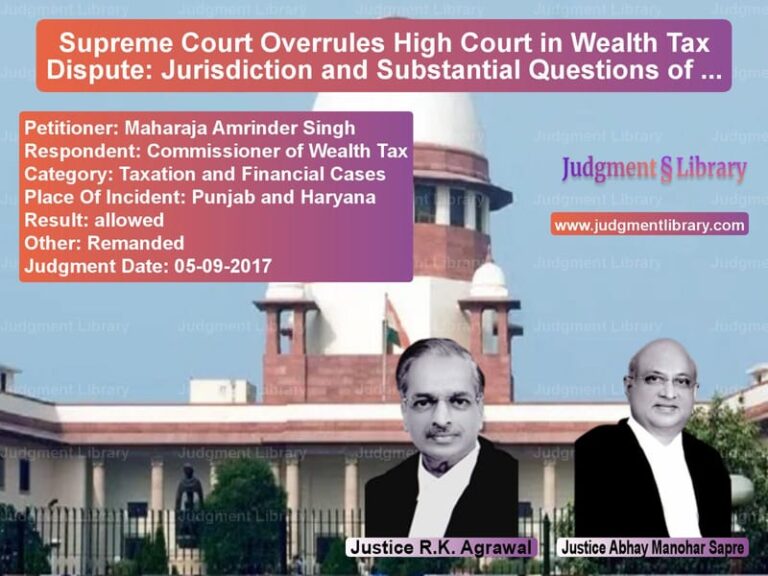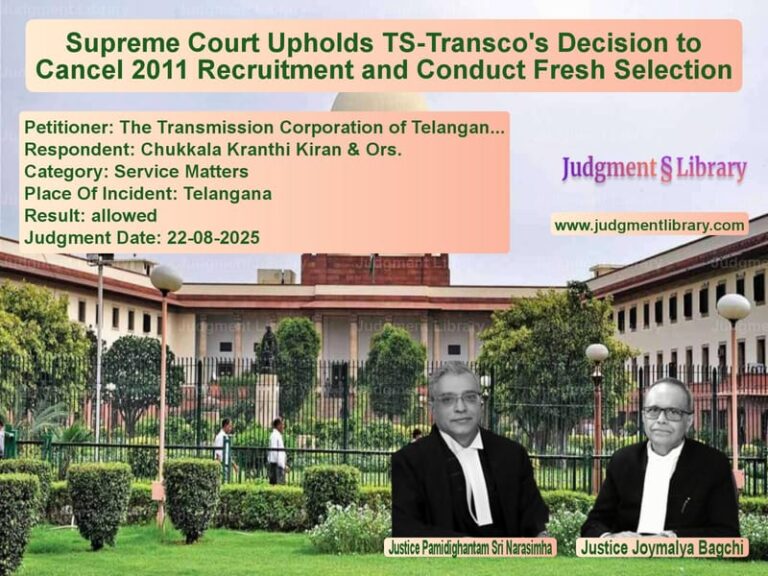Supreme Court Upholds Acquittal in Uttarakhand Murder Case Due to Inconsistent Testimonies
The Supreme Court of India, in its judgment dated February 6, 2025, upheld the acquittal of Deepu Verma @ Devendra Lal in a murder case, rejecting the State of Uttarakhand’s appeal. The Court found that the inconsistencies in eyewitness testimonies created reasonable doubt, and reaffirmed the principle that benefit of doubt should be given to the accused in criminal trials.
Background of the Case
The case arose from an incident in which the accused, Deepu Verma, was alleged to have murdered Hira Lal Verma with a sickle. The prosecution’s case was primarily based on the testimony of three alleged eyewitnesses: PW-1 (Ganeshi Lal), PW-2 (Nirmala Verma), and PW-4 (Hira Devi). The trial court convicted Deepu Verma under Section 302 of the Indian Penal Code (IPC), sentencing him to life imprisonment.
On appeal, the Uttarakhand High Court overturned the conviction, citing inconsistencies in the prosecution’s evidence. Aggrieved by this decision, the State of Uttarakhand challenged the acquittal before the Supreme Court.
Petitioner’s Arguments (State of Uttarakhand)
The Additional Advocate General for the State argued:
- The trial court had correctly convicted the accused based on the consistent testimony of multiple eyewitnesses.
- PW-1, PW-2, and PW-4 had all seen the accused attacking the victim with a sickle.
- Minor inconsistencies in witness testimonies are natural in cases involving rustic villagers and should not lead to acquittal.
- The High Court erred in setting aside the conviction merely because of minor contradictions.
Respondent’s Arguments (Deepu Verma @ Devendra Lal)
The defense countered:
- There were serious inconsistencies in the eyewitness testimonies regarding who reached the crime scene first and whether the accused was seen at the time of the assault.
- PW-1 claimed to have seen the accused assaulting the victim, but PW-2 and PW-4 stated that by the time they arrived, the accused had already fled.
- PW-4 had weak eyesight and admitted she could only see objects within 10-12 steps, making her testimony unreliable.
- The prosecution failed to establish motive beyond a reasonable doubt.
- Given the contradictions, the High Court was justified in granting the benefit of doubt to the accused.
Supreme Court’s Observations
The Supreme Court reaffirmed the principle that an acquittal should not be overturned unless the view taken by the High Court is “totally perverse or impossible.” The Court held:
“Unless the view taken by the High Court is found to be totally perverse or impossible, it will not be permissible for this Court to interfere with the same.”
The Court further noted:
“If two views are possible and one of the views is taken by the High Court, merely because the other view appears to be a possible view, the same cannot be a ground to interfere with the finding of acquittal.”
Final Judgment
The Supreme Court ruled:
- The inconsistencies in the testimonies of PW-1, PW-2, and PW-4 created reasonable doubt.
- Given these doubts, the benefit must go to the accused as per established criminal jurisprudence.
- The High Court’s decision to set aside the conviction was neither perverse nor unreasonable.
- Accordingly, the appeal by the State of Uttarakhand was dismissed, and the acquittal of Deepu Verma was upheld.
Impact of the Judgment
This judgment has significant implications for criminal law:
- Reinforcing the Benefit of Doubt Principle: The ruling strengthens the jurisprudence that any reasonable doubt in criminal trials must benefit the accused.
- Evaluating Eyewitness Testimonies: Courts must carefully scrutinize inconsistencies in eyewitness accounts before convicting an accused.
- Limiting Appeals Against Acquittals: The Supreme Court reiterated that acquittals should not be overturned unless the lower court’s findings are manifestly perverse.
Conclusion
The Supreme Court’s judgment in State of Uttarakhand v. Deepu Verma underscores the importance of consistency in witness testimonies in criminal trials. By upholding the High Court’s acquittal, the Court reinforced the fundamental principle that the prosecution must establish guilt beyond a reasonable doubt. The ruling ensures that accused individuals are not convicted based on contradictory or weak evidence, preserving the fairness of the criminal justice system.
Petitioner Name: State of Uttarakhand.Respondent Name: Deepu Verma @ Devendra Lal.Judgment By: Justice B.R. Gavai, Justice K. Vinod Chandran.Place Of Incident: Uttarakhand.Judgment Date: 06-02-2025.
Don’t miss out on the full details! Download the complete judgment in PDF format below and gain valuable insights instantly!
Download Judgment: state-of-uttarakhand-vs-deepu-verma-@-devend-supreme-court-of-india-judgment-dated-06-02-2025.pdf
Directly Download Judgment: Directly download this Judgment
See all petitions in Murder Cases
See all petitions in Bail and Anticipatory Bail
See all petitions in Judgment by B R Gavai
See all petitions in Judgment by K. Vinod Chandran
See all petitions in dismissed
See all petitions in supreme court of India judgments February 2025
See all petitions in 2025 judgments
See all posts in Criminal Cases Category
See all allowed petitions in Criminal Cases Category
See all Dismissed petitions in Criminal Cases Category
See all partially allowed petitions in Criminal Cases Category







